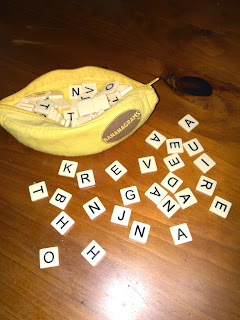Research into the importance of
play in early childhood is well documented and from personal experience as an
English teacher every age group enjoys the learning process when its fun. It
motivating and a wonderful way to teach a language. So I thought about sharing
with you some games and activities we enjoy together as a family.
Shopping list – this game I picked up at a church stall in Madrid.
The game is played with the basic concept of memory where each tile is flipped
over if it matches an ítem on the shopping list then you get to put it in your
trolley. If your little one is 2 or 3 you can play the ´Can you see the
´x´?…game. Tiles facing up and they have to identify it. Too easy and it takes
about 15 mins for a game to finish. Communication skills, turn taking, memory
building and vocabulary….brillant. Add concentration skills there too.
Bananagrams – another Madrid bargain find…if you have played
Scrabble this is better because it isn´t limited to a board. Great for
spelling, pronunciation, reading, communication skills, turn taking. Kiddies
just have to be out of the ´small pieces´range.
Bingo – another game for kiddies 4 +. We actually bought this one
after a New Year´s Eve game at their grandparents place and the beginning of
number recognition for Mr. A. Its noisy and dynamic he loved it. It is a quite
a long game to play so also developing not only number recognition and sequence
but concentration skills too.
Uno – You can play this anywhere and simplify the game by removing
the more complicated cards. You can just play with the colours for the very
young – even sorting by color can be a game, ´Pick up 3 red cards´and this way
the little person can also make up the rules too.
Recently, we added Monopoly to our games collection - the Sydney version!…so the
idea of saving, spending, investing, addition, subtraction and even paying
taxes is involved! Valuable financial education in the mix.
What game to choose? Look at what
stage your child is in…the best games I find are the ones I enjoyed as a child,
your interest creates their interest. Look for games that are simple and can be
adaptable. Games don´t necessarily have to be language focused the importance
is play. Valuable family time is also essential in this modern day where iPads
and touch screens are the norm. And your little one might even surprise you as
Mr. M did at the age of 2 and a bit who showed me how much he understood about
the ´rules´ of memory and turn taking – just by watching us play.
Do you play any games? What games do you like to play?
Tessa
* Please note games featured have not been sponsored by the games makers.
_________________________________________________________________
La importancia de jugar en los
primeros años de niño está reconocida por la
investigación y por mi parte, como profesora de inglés, en todas las edades se
disfruta aprendiendo cuando uno se divierte. Da mucha motivación y es una manera
maravillosa para enseñar y compartir otro idioma. Así que pensé en compartir
los juegos que disfrutamos en familia.
Shopping list – Es un juego que compré en un mercado de segunda
mano en Madrid. El juego está basado en las reglas de memoria donde se busca la
pareja del dibujo en la lista de la compra de cada uno y se coloca en su carro de la compra. Si tu
peque tiene 2 o 3 años también se puede simplificar el juego con menos fichas y
cara arriba preguntando '¿Puedes ver 'x'? Es fácil y se tarda unos 15 minutos
en jugar. Las capacidades de comunicar, esperar turno, desarrollo de la memoria
y vocabulario...fantástico. También añade la capacidad de concentración.
Bananagrams – Otro tesoro de un mercadillo en Madrid. Si has jugado
Scrabble alguna vez, este juego es mejor, porque no está limitado por el
fichero. Está muy bien para la ortografía, pronunciación, leer, capacidad de
comunicación, esperar turno. Aunque es
verdad que los niños ya tienen que tener una edad, que no se metan cosas
pequeñas en la boca.
Bingo – Un juego para niños/as de 4 años. Realmente compramos este
juego después de una noche vieja en la casa de los abuelos y cuando comenzó a
aprender los números. Es ruidoso y muy dinámico y al peque le encantó. En una
partida bastante larga trabaja con números, secuencias y concentración.
Uno – Se puede jugar con esto en cualquier sitio y simplificarlo
quitando las cartas más complicadas. Con los muy pequeños se puede jugar
colocando las cartas por colores. Además de elegir un color, también puede ser
un juego, por ejemplo: 'Coge 3 cartas rojas' y también así tu peque puede hacer
sus propias reglas.
Hace poco añadimos el Monopoly a nuestra colección - ¡la version de Sidney!….la idea
de ahorrar, gastar, invertir, sumar, quitar y también de pagar impuestos, todo
incluyendo….una educación financiera.
Ahora ¿Qué juego elijo?. Hay que
pensar en qué edad está tu peque….los mejores son los que yo disfrutaba cuando era pequeña. Creo que mi interés también ha generado su interés. Busca juegos que
sean simples y adaptables. Los juegos no tienen que ser juegos de idiomas, la
importancia es jugar. El tiempo familiar es importante en estos tiempos donde
mandan las tablets y las pantallas digitales. Puede que tu peque te sorprenda
enseñando lo que se entiende como 'Sr. M' cuando tenia un poco más de 2 años.
Me sorprendió cuando vi que entendía las reglas de 'memoria' y de esperar
turno, simplemente viéndonos jugar.
¿Juegas a algunos juegos?, ¿ A qué te gusta jugar con tus peques?




No comments:
Post a Comment